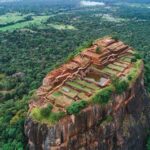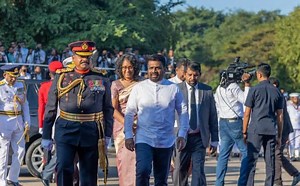
Wide Angle Zoom into New Approach to Independence Day and Governance
- CNL Reporter
- February 10, 2025
- Power and energy, Weekly Political Review
- Weekly Political review
- 0 Comments
Weekly Political review
Sri Lanka’s Political Landscape under President AKD’s Reforms, Challenges, and Strategic Moves
By Rohana Jith
President Anura Kumara Dissanayake (AKD) and the National People’s Power (NPP) government received significant public appreciation for their simple yet dignified approach to Sri Lanka’s 77th Independence Day celebrations.
Despite growing public concerns over rising living costs and demands for justice in high-profile cases such as the assassination of journalist Lasantha Wickrematunge, the government chose to conduct the celebrations with reduced expenses, in stark contrast to previous administrations.
The participation in the Independence Day parade was scaled down, reducing the number of personnel from 3,384 to 1,873 and eliminating military artillery and armed vehicles. The number of aircraft in the parade was also reduced from 19 to three.
The overall cost of the event was slashed from Rs. 200 million to Rs. 80 million. In contrast, expenses under former President Ranil Wickremesinghe’s administration were significantly higher, with exorbitant costs recorded for items such as the national flag, refreshments, lodging, and floral tributes.
One of the key moments of the ceremony was the singing of the National Anthem in Tamil, signaling the government’s commitment to national unity and inclusivity. This move was well-received by the public, reinforcing the NPP’s break from traditional governance methods that prioritized elite and family-centered politics.
Promises of Reform and Rising Concerns
While the NPP’s rise to power was characterized by a promise to depart from the political practices of the past, some pledges made during the election campaign remain unfulfilled. Key issues such as the repeal of the Prevention of Terrorism Act (PTA), the release of Tamil political prisoners, and the return of privately owned lands occupied during the civil war are yet to be addressed.
Recent statements by some Cabinet Ministers have caused concerns regarding potential backtracking on these commitments. The assertion that there are no political prisoners and that the PTA would be amended rather than repealed has raised alarms among human rights advocates.
Similarly, the government’s stance on reforms related to Muslim marriage laws has been made conditional on achieving community consensus. This approach has led to comparisons with the leftist coalition government of 1970, which abandoned key promises from its election manifesto, leading to political instability. The NPP must ensure that it upholds its commitments to maintain public trust.
Economic Challenges and IMF Policies

A pressing issue for the NPP government is addressing the stringent IMF-driven austerity measures that have impacted the working class. While the administration aims to reduce government spending and increase revenue, a balance must be struck to prevent a reliance on continuous borrowing. Economic reforms must focus on increasing investment, curbing corruption, and reducing wastage.
These measures are critical to closing the trade deficit and stabilizing the economy without further burdening the population.
Strategic Engagements and Foreign Relations
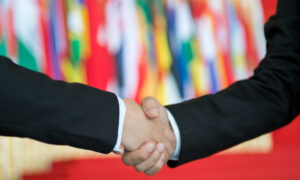
President Dissanayake’s upcoming visit to the United Arab Emirates (UAE) for the World Governments Summit 2025 marks an important step in Sri Lanka’s diplomatic and economic engagement.
He is expected to meet key global figures and discuss potential investments, particularly in the energy sector. Discussions had previously taken place under the Wickremesinghe administration regarding Sri Lanka’s participation in the India-GCC (Gulf Cooperation Council) initiative, which aims to establish a multi-product pipeline linking South Asia with Gulf oil and gas producers.
The UAE has long been an influential partner for Sri Lanka, both in terms of trade and labor remittances. In 2023, Sri Lankan overseas remittances totaled USD 6.5 billion, exceeding revenues from tourism and garment exports.
A significant portion of this income comes from Sri Lankan domestic workers, predominantly women in the 40-44 age group, employed in West Asia. While this sector contributes heavily to the national economy, it also brings social challenges, such as the rise in orphaned children due to prolonged parental absence.
Beyond labor, Sri Lanka maintains strong trade relations with the UAE, exporting tea, gems, and fresh coconuts. The UAE also extends financial assistance through the Abu Dhabi Fund for Development and supports Sri Lanka in international forums like the UN Human Rights Council.
However, concerns remain over the region’s role as a safe haven for illicit financial transactions and the narcotics trade. Previous efforts by former President Maithripala Sirisena to uncover funds illegally stashed in Dubai were unsuccessful, highlighting the need for better oversight and international cooperation.
Corruption and Accountability: The Aftermath of the Aragalaya Protests
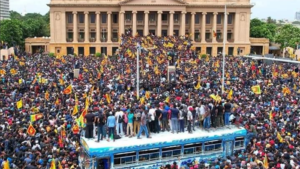
A major revelation in Parliament exposed how 43 former ministers collectively received over Rs. 1.2 billion in compensation for damages incurred during the 2022 Aragalaya protests, which led to the downfall of the Rajapaksa regime. Notably, former President Wickremesinghe did not claim compensation despite his Kollupitiya residence being one of the most valuable properties destroyed. Allegations have surfaced that some compensated individuals manipulated government officials to inflate damage estimates. The current government has yet to indicate whether it will reassess these claims.
The SJB-UNP Alliance: Political Uncertainty and Internal Struggles
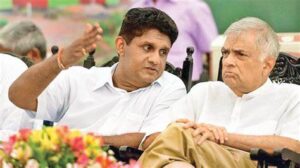
Discussions between the Samagi Jana Balawegaya (SJB) and the United National Party (UNP) regarding a political alliance have seen mixed developments. The primary contention revolves around the symbol under which the alliance would contest in the upcoming Local Government (LG) elections. While the UNP favors its traditional ‘elephant’ symbol, the SJB insists on retaining its ‘telephone’ symbol to maintain voter recognition.
A possible compromise could see candidates contesting under the UNP symbol in select areas such as Colombo, Nuwara Eliya, and Kuliyapitiya, where the party has a strong voter base, while using the SJB symbol elsewhere.
However, internal opposition within the SJB, particularly from loyalists of party leader Sajith Premadasa, is hindering progress. Some members fear that UNP leader Wickremesinghe is strategically attempting to weaken the SJB by persuading MPs to defect.
Further suspicions arose when former minister Harin Fernando, now aligned with Wickremesinghe, unexpectedly attended a key meeting between the two parties. His presence has fueled speculation that the UNP is attempting to undermine Premadasa’s leadership.
Meanwhile, government-affiliated groups have launched a social media campaign against the proposed alliance, portraying it as an opportunistic reunion of former political adversaries.
The formation of an SJB-UNP alliance remains uncertain as grassroots-level opposition within the SJB continues to mount. While some party members advocate for unity, others see it as a betrayal of their movement.
The coming weeks will determine whether both parties can reach a compromise or whether internal divisions will further weaken the opposition’s chances in the upcoming elections.
Conclusion: A Critical Juncture for Sri Lanka’s Future
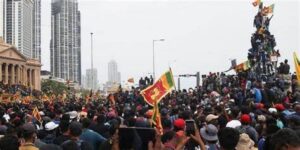
President Anura Kumara Dissanayake’s administration has shown a commitment to reform and economic stability, but key promises remain unfulfilled, leading to skepticism among various groups.
The government must navigate economic challenges, uphold human rights commitments, and maintain fiscal responsibility to avoid repeating past mistakes.
The evolving political dynamics between the SJB and UNP further add to the complexity, with internal rifts threatening to weaken the opposition. Meanwhile, Sri Lanka’s engagement with the UAE and other Gulf nations could provide economic opportunities if managed effectively.
As the country moves forward, the ability of the NPP government to deliver on its pledges, tackle corruption, and stabilize the economy will determine its long-term success. Public trust remains fragile, and the coming months will be crucial in shaping the future political and economic landscape of Sri Lanka.

